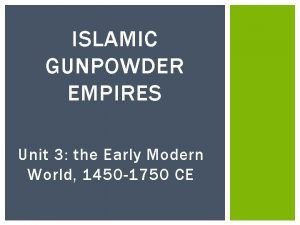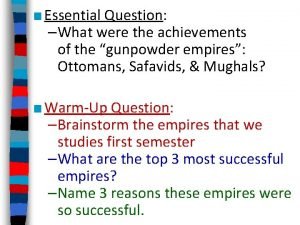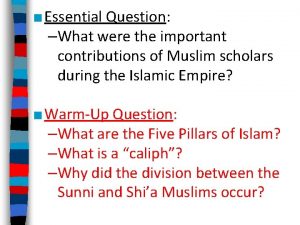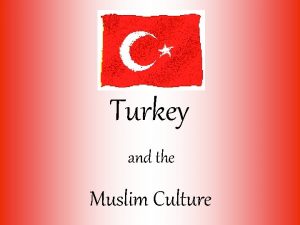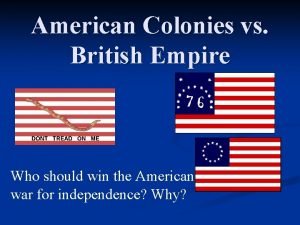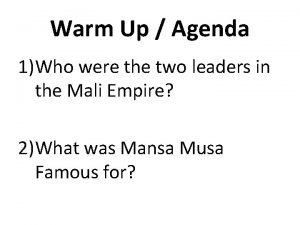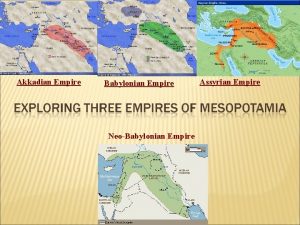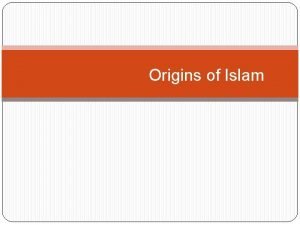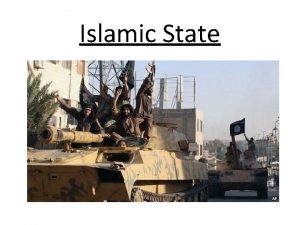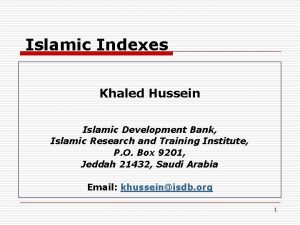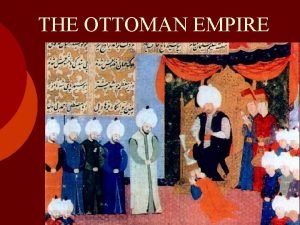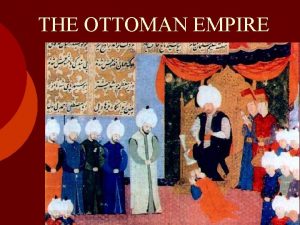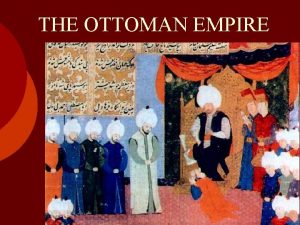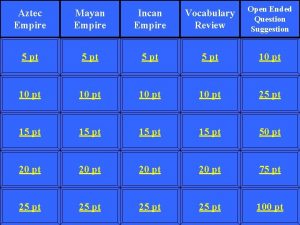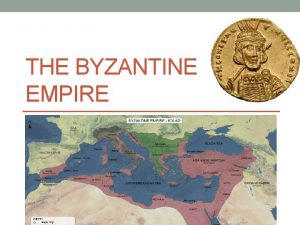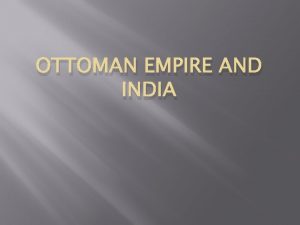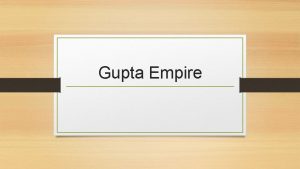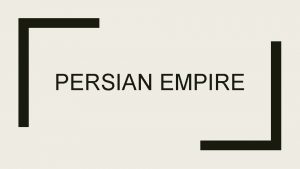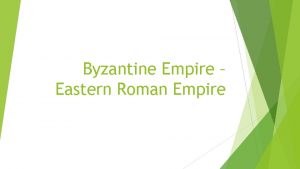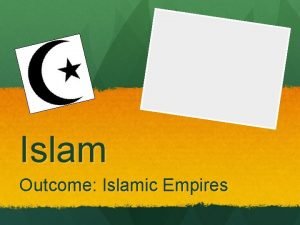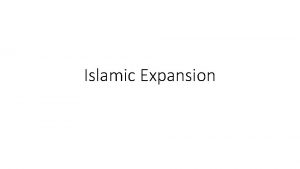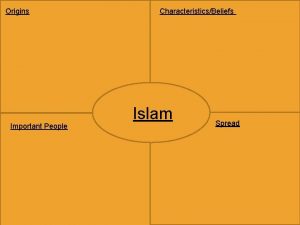Islam The Islamic empire Origins of Islam In





















- Slides: 21

Islam & The Islamic empire

Origins of Islam • In 570, Muhammad was born in Mecca • During this time, the northern portion of Middle East was dominated by the Christian Byzantine Empire & the Zoroastrian Sassanid Persian Empire • There was no centralized authority within the Arabian peninsula • Independent tribes ruled & benefitted from the lucrative trade routes • Tribes traded frankincense & myrrh with the Persians & Byzantines • Mecca was an important trading town • Mecca also served as important religious site for polytheistic Arabs because of the Ka’ba

Origins of Islam • Muhammad became a merchant & eventually married a wealthy widow, Khadijah • Financially secure, Muhammad now turned to spiritual pursuits which included meditating in the mountain caves outside of Mecca. • In about 610, Muhammad began to have visions while meditating. • He believed that these visions were the Angel Gabriel delivering a message from the one true God (Allah in Arabic) • The message delivered in these revelation outlined the basic beliefs of Islam & were eventually recorded in the Quran

Origins of Islam • Muslims believe only the Quran contains God’s words • They do also believe that the Jewish and Christian holy books contain religious truth • Christians & Jews are called “People of the Book”

Basic Beliefs of Islam • Basic beliefs of Islam are outlined in the 6 Articles of Faith • the belief in one God that created all of things belief • that God sent a series of messengers (prophets) including Noah, Abraham, Moses, & Jesus. • Each prophet delivered a divine message which is preserved in the Books of God, these include the Torah, Gospels, Psalms, and Scrolls. • According to Islam, Muhammad is God’s final messenger and he has delivered God’s exact words in the form of the Quran

• Muslims look to the Hadith & Sunnah • words and deeds of the Prophet Muhammad • Used to guide everyday life. Basic Beliefs of Islam • Five Pillars of Islam • Basic practices of Islam (Faith, Prayer, Charity, Fasting, & Hajj) • Muslim scholars have used these various sources of religious truth to compile Shariah, or Islamic, law • regulates public & private affairs in Muslim states.

Islam spreads • Muhammad began to share his message with the people of Mecca after 610 • The message was not well received as it threatened Mecca’s traditional role as a pilgrimage destination for the polytheistic Arabs. • Muhammad led his followers to the city of Medina in 622 to flee persecution. • Most of the population of Medina accepted Muhammad as the Messenger of God & converted • The Meccan migrants & the converts of Medina, unified under a single faith, now formed the Umma, a political and religious body of Islam. • The conflict with Mecca continued until 630 • the armies of the Umma successfully defeated Mecca. • by his death in 632, most of the Arabian Peninsula was unified under the authority of the Umma.

• Leadership of Islam passed to a successor called a caliph. • Under the first 4 caliphs, the Umma now known as a caliphate continued to expand. Islam spreads • By 661, the caliphate included all of the Arabian Peninsula, Persia, Palestine, & Egypt • Political authority of the caliphate spread quickly but Islam did not • Civil war broke out in 656 due to conflict over leadership of the religion

Islamic Empires • The Umayyads won the civil war & ruled from 661 to 750 (Umayyad caliphs remained in power in Spain until 1031). • Under the Umayyads the caliphate expanded to include all of North Africa, the Iberian Peninsula, & parts of Central Asia. • The Umayyad government & army was dominated by Arabs, however the empire was ethnically diverse. • Ethnic conflicts led to unrest & in 750 the Umayyad dynasty was overthrown

Islamic Empires • The Abbasid Caliphate replaced the Umayyads & held the position until the last Abbasid Caliph was killed by the Mongols in 1258. • The Abbasid caliphs were never able to maintain the level of political unity or centralized authority of the Umayyads. • Abbasid authority never extended to Iberia & by 969 a rival caliphate, the Fatimids, controlled Northern Africa & parts of Palestine & the Arabian Peninsula.

The Split Within Islam Sunni vs Shi’ite

Conflict Within Islam • While alive, Muhammad never established a plan for leadership of the Umma • After his death the 1 st 3 caliphs were selected from among his close companions & generally ruled without controversy until year 656

Map of Followers of Islam Blue = Shi’Ite Green = Sunni

Economic Impact of Islam

Islamic Trade Routes • The Islamic world laid at the heart of 4 of the world’s major trade routes in the period from 600 to 1300 • The stability offered by these vast Islamic caliphates fostered the growth of these trade routes & prosperity of the regions they connected • These trade routes include the Mediterranean, Trans-Saharan caravan route, Silk Road, & the Indian Ocean maritime system • Together these interconnected routes linked the manufactures, mines markets of China, Southeast Asia, India, East Africa, the Middle East, Central Asia, West Africa, & Europe

Islamic Trade Routes • Trade along Islamic trade routes included the exchange of key commodities • China - silk and porcelain • South & SE Asia - spices & textiles • Africa - ivory, slaves, & gold • Europe - glass • Middle East - metalware, slaves, & textiles

Islamic Trade Routes • Trade along Islamic trade routes was facilitated by technological advances • Arab dhow made travel in the Indian Ocean easier • it was equipped with a triangular lateen sail that increased the ship’s maneuverability • Arabian camel saddles that diffused to North Africa improved the security & efficiency of trans. Saharan trade • The common moral code that Islam offered also promoted the growth of trade in the region • Taken together, these Afro-Eurasian trade routes that meet in the Muslim world spurred the entire region’s economic growth • This growth is evidenced by the increased prosperity in major trading cities like Timbuktu, Mombasa, Alexandra, Constantinople, Venice, Hormuz, Baghdad, Melaka, Calicut, Canton, & Hangzhou among others

Major Contributions of Islam

Major Contributions of Islam • 2 key factors intercepted in the period 600 to 1300 to make the Islamic world a center of learning • 1 st - the Islamic world was at the intersection of Afro-Eurasia’s major trade routes • this fostered a cosmopolitan atmosphere were intellectuals from different regions could meet and exchange ideas • Early scholarship from Greece & Rome was translated, preserved & improved upon. • Indian mathematics including the number system that becomes known as Arabic numerals in the West was applied to the development of algebra • Chinese paper making technology allowed the creation of vast libraries & Chinese technologies related to navigation, astronomy, & gunpowder were refined • These refinements would eventually facilitate the age of exploration in Europe.

Major Contributions of Islam • 2 nd - the expectation that all believers read the Quran promoted literacy in a universal language, Arabic, & the establishment of an extensive educational system • Baghdad, Damascus, Cordoba, & Timbuktu among other cities became what we might call university towns • This intellectual development was centered on the madrasas, a religious college were scholars studied many disciplines of learning • In the field of science, Ibn Sina authored Canon of Medicine which became the authoritative medical text in the Middle East & Europe until the 1600 s • In the field of geography, Ibn Battuta’s Travels vastly improved knowledge of cultural & physical geography in the Islamic world & beyond.

 Empires
Empires How big was the islamic empire
How big was the islamic empire Islamic empire map activity answer key
Islamic empire map activity answer key Largest islamic empire
Largest islamic empire Daily life roman empire
Daily life roman empire Venn diagram of mauryan and gupta empires
Venn diagram of mauryan and gupta empires American empire vs british empire
American empire vs british empire What do you think was askia’s greatest accomplishment?
What do you think was askia’s greatest accomplishment? Sistem perundangan islam tasawwur
Sistem perundangan islam tasawwur Matlamat sistem perundangan islam
Matlamat sistem perundangan islam Latar belakang kerajaan bani abbasiyah
Latar belakang kerajaan bani abbasiyah ưu thế lai là gì
ưu thế lai là gì Tư thế ngồi viết
Tư thế ngồi viết Thẻ vin
Thẻ vin Thơ thất ngôn tứ tuyệt đường luật
Thơ thất ngôn tứ tuyệt đường luật Bàn tay mà dây bẩn
Bàn tay mà dây bẩn Các châu lục và đại dương trên thế giới
Các châu lục và đại dương trên thế giới Từ ngữ thể hiện lòng nhân hậu
Từ ngữ thể hiện lòng nhân hậu Diễn thế sinh thái là
Diễn thế sinh thái là Frameset trong html5
Frameset trong html5 Thế nào là giọng cùng tên? *
Thế nào là giọng cùng tên? * Làm thế nào để 102-1=99
Làm thế nào để 102-1=99
